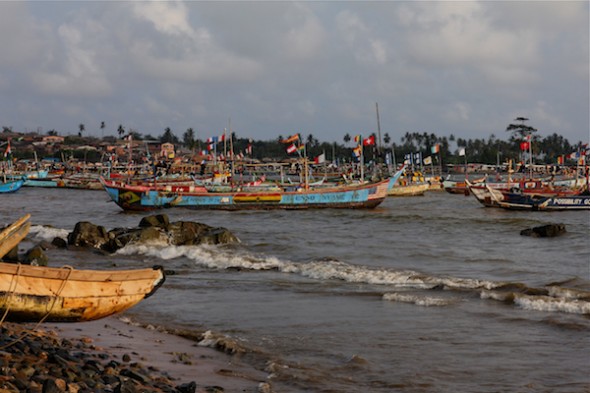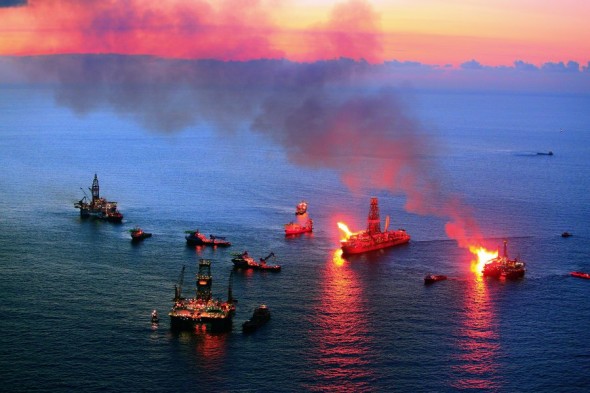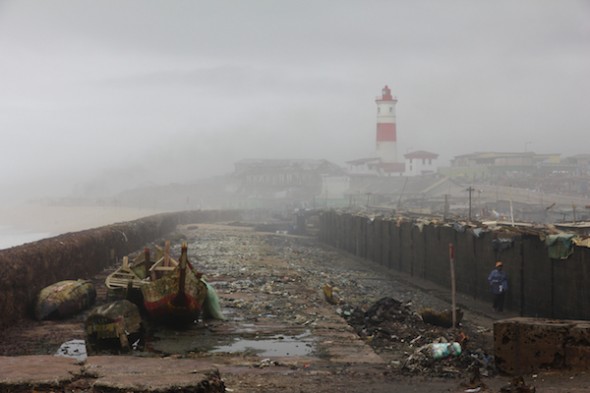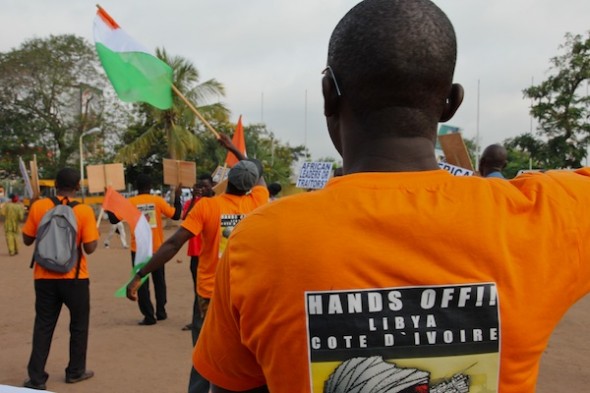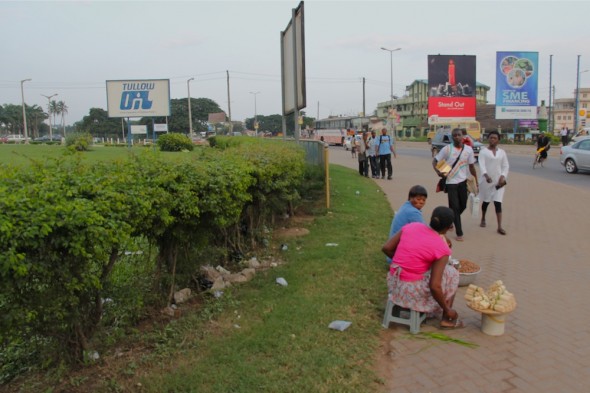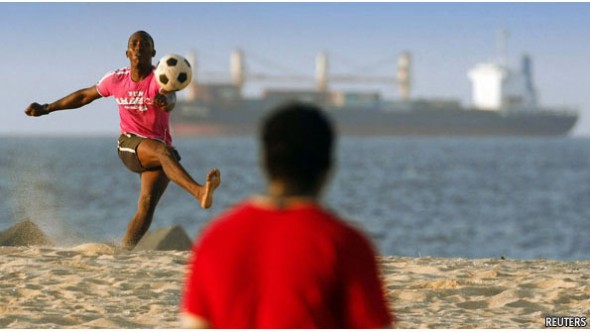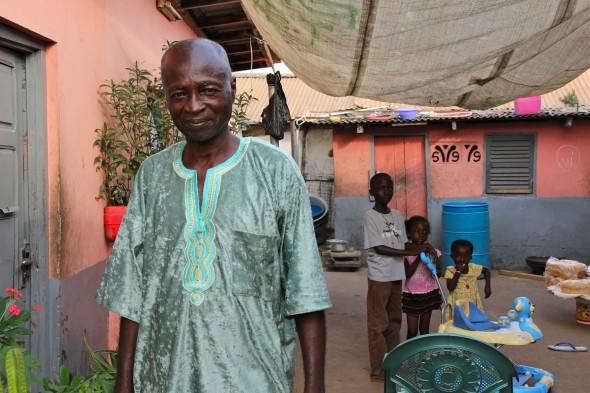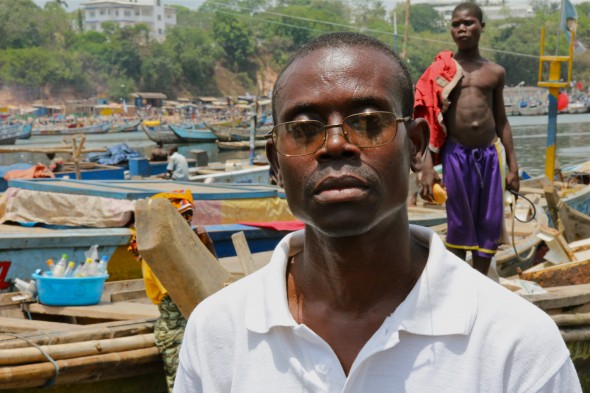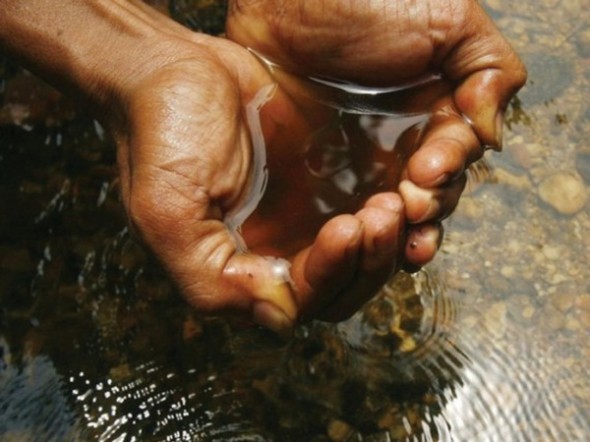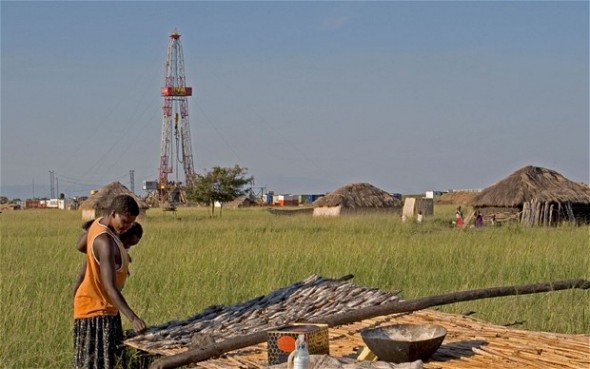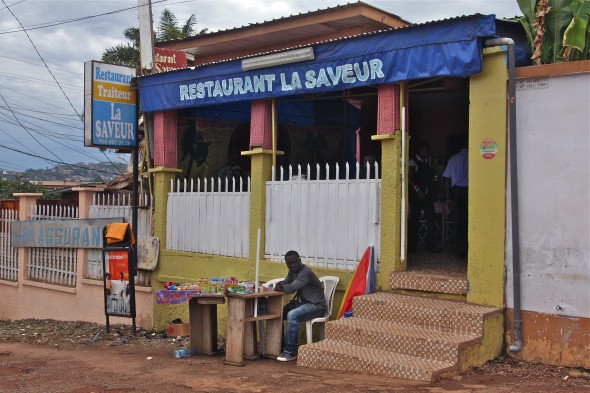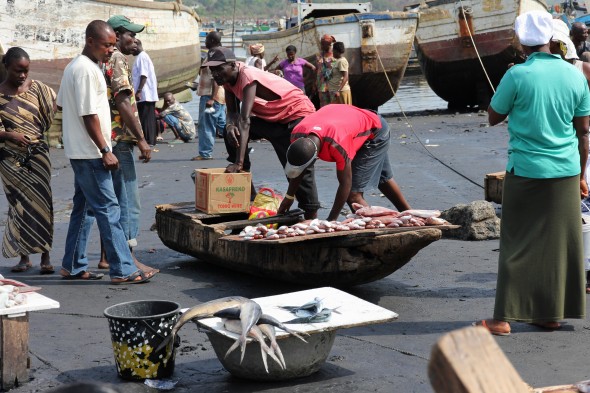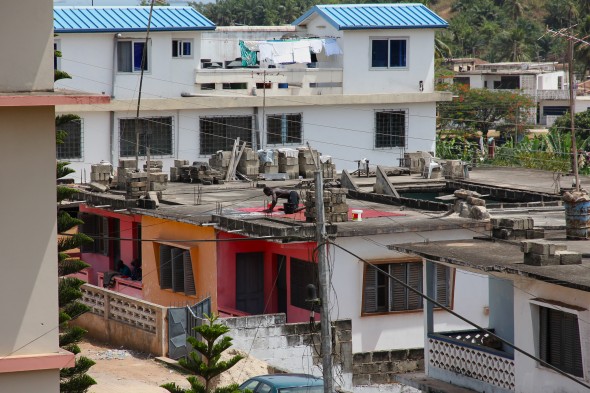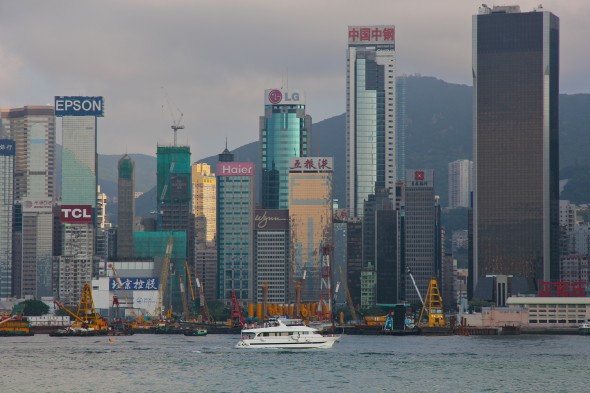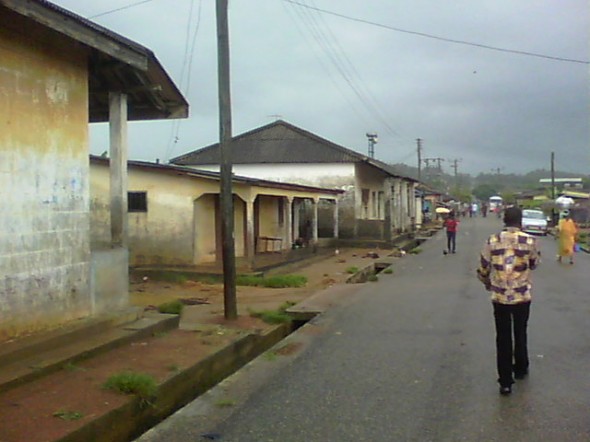Gas flaring and Axim: an update…sort of
Last month I wrote about strange eye infections in Axim that some locals blamed on gas flaring. Axim, or Tired of Talk, I titled the post because local citizens were frustrated with talk that rarely seemed to get followed by action. When I visited Axim in August residents had been waiting several months for oil company officials to carry through on promises to send out a medical team for screenings.
Voices from the Gulf: Best Place
Have you seen this? BP is out to win the hearts and minds of Gulf Coast residents with upbeat videos on YouTube. Everything is great! Based on the comments I’ve read so far, it doesn’t look like their campaign is having much success.
Recent news accounts also paint a more nuanced picture of Gulf Coast “recovery”: BIRMINGHAM, Ala. — Tar balls washed onto Gulf of Mexico beaches by Tropical Storm Lee earlier this month show that oil left over from last year’s BP spill isn’t breaking down as quickly as some scientists thought it would, university researchers said Tuesday.
Pipelines: More on the Montana – Cameroon connection
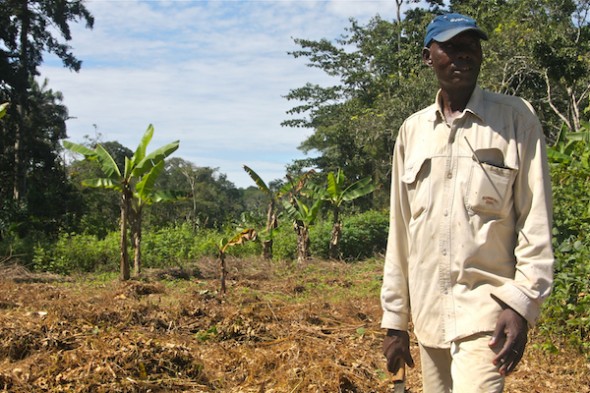
Farmer Jean Edzoa standing on the pipeline easement near Yaounde. He and other farmers in the area complain that "nothing grows" around the pipeline. Photo by Christiane Badgley
I recently wrote about ExxonMobil’s July oil spill in Montana and what lessons the Yellowstone River accident may have for Cameroon.
The same day an article in The New York Times, Pipeline Spills Put Safeguards Under Scrutiny, analyzed the regulation and oversight of the 167,000-mile system of hazardous liquid pipelines crisscrossing the United States.
The article describes a federal monitoring agency that is, “chronically short of inspectors and lacks the resources needed to hire more, leaving too much of the regulatory control in the hands of pipeline operators themselves…”
Federal Investigation: BP shortcuts led to Deepwater Horizon disaster
The U.S. government has released its report of the federal investigation of the Macondo well blowout. Although the investigators hold BP, the well’s owner, responsible for the accident, Transocean and Halliburton share the blame for many of the mistakes that led to the largest oil spill in U.S. history.
Both Transocean and Halliburton are active in Ghana. Transocean got a bit of (bad) publicity in June when its Marianas rig, operating in Ghana, had to be evacuated after it began taking on water.
An early morning in James Town
It’s a gray and damp early morning in James Town. The lighthouse in the mist makes me think of northern California.
What Happened at the Macondo Well?
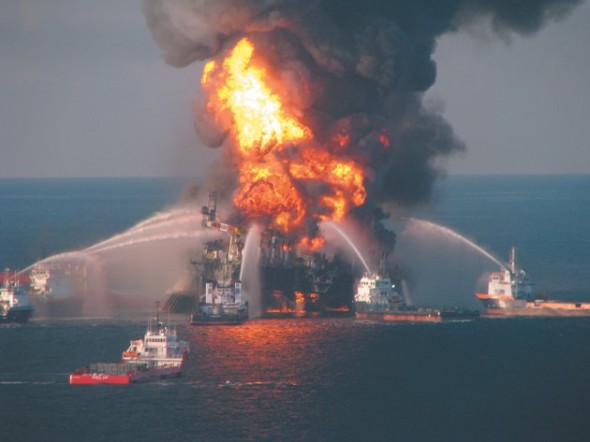
Fireboat response crews battling the blazing remnants of the Deepwater Horizon, the offshore drilling rig owned by Transocean that exploded when BP’s Macondo oil well ruptured in the Gulf of Mexico, April 21, 2010. Photo: U.S. Coast Guard
Journalist and author Peter Maass has reviewed four recently published books on the Deepwater Horizon disaster. Maass, whose book Crude World: The Violent Twilight of Oil is a searing indictment of the global oil industry, knows only too well that BP is hardly the bad apple. As he says in the review, “BP recklessly cut corners whenever it could, but so did Transocean, and so did—does—the rest of the fossil fuel industry.”
Understanding the Deepwater Horizon disaster is important then, because of what happened of course, but also because this can happen again, anywhere.
Exxon spill in Montana: lessons for Cameroon?
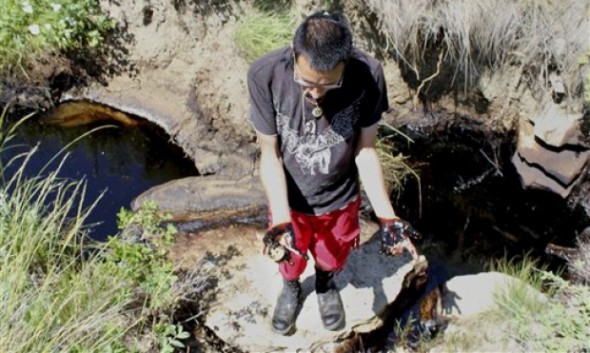
A member of the Blackfeet Tribe takes 'water' samples for a community hospital water lab near Cut Bank Creek, Mont. Photo: Destini Vaile/AP
On July 1 an ExxonMobil underground pipeline ruptured near Laurel, Montana, spilling tens of thousands of gallons of crude oil into the Yellowstone River. Montana is a long way from Africa, but this spill has me thinking about the Chad-Cameroon oil pipeline, another ExxonMobil underground pipeline that passes below several rivers where water pressure and erosion are real concerns.
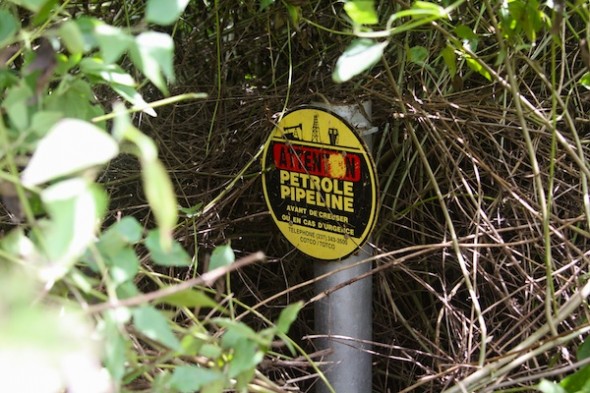
The 30 meter wide pipeline easement is supposed to be kept cleared at all times. This pipeline marker was buried under thick brush in clear violation of safety regulations. Photo by Christiane Badgley
Environmentalists in Cameroon and Chad have long been concerned about the safety of the 1070 km Chad-Cameroon oil pipeline and have stated repeatedly that COTCO (ExxonMobil pipeline operations in Cameroon) has not provided reliable information about its real capacity to respond in the event of an oil spill. Much of the pipeline crosses relatively remote and hard-to-access areas (few or no roads) and many question COTCO’s assertions that response teams could quickly travel to the scene of any incident.
Waiting for Kosmos…
Waiting for Kosmos. I wait endlessly and (so far) in vain for a meeting with someone I do not know. Does this sound familiar? If and when we meet, I will likely learn nothing. But then I would be able to say that Mr. X of Kosmos Energy assures me that all matters have been amicably resolved, which would make my reporting appear somehow more objective. A meaningless statement is better than no statement, or so goes the logic.
Libya, Gaddafi, oil: another view
On the African continent, a more nuanced appreciation of Gaddafi and the Libyan rebels.
While fighting continues across Libya, grisly details of the NATO-backed assault on Tripoli are beginning to emerge. At the same time the rush for Libya’s oil is on and it appears that the countries who provided early support for the rebels will have a competitive edge for new oil contracts (read The rush to grab the trophy is on! in Arab News for more details on likely winners and losers in the post-Gaddafi era).
Can Europeans pressure their oil companies to do better in Africa?
Chatham House has released a new study on the impact of oil companies on health and the environment in Africa. The study, prepared for the European Parliament, covers the problems associated with oil production in Africa and suggests what European citizens can do to affect change. There are a number of ways that Europeans (and Americans) can engage with their oil companies and governments to push for more effective regulation and better business practices. The article I’ve posted below, from IDN, reminds European readers that they need to take an active role in working for a better (cleaner, safer, more transparent) oil industry in Africa.
Revelations in the Economist: The Queensway syndicate and the Africa trade
Anti-corruption campaigner, Global Witness, has released the results of a months’ long investigation into the shadowy China Sonangol syndicate. The Economist ran an in-depth feature article on August 12th based, in part, on the Global Witness investigation. China Sonangol, known also as The China International Fund or the “Queensway Syndicate” is a corporate partnership that started trading oil in Angola and now operates in oil markets around the world. The Economist article is a must-read for anyone interested in oil and the so-called “resource curse.” The Global Witness report provides more information, as well as proposals for curtailing this type of illicit trading.
Ecuador: Four months to save one of the world’s last great wildernesses
An update on Ecuador’s innovative proposal to leave its oil under the soil, from The Observer:
When large reserves of oil were discovered under Yasuní national park, Ecuador offered the world a choice: give us money and we will not allow drilling. Now $60m must be found by December.
Axim, or Tired of Talk
I took a trip to Axim today. Axim is a town about an hour’s drive west of Takoradi. It’s a major fishing port, one of the largest in Ghana. There are 800 fishing canoes operating out of Axim and some of the big canoes have 20 person crews. So from Brewire to Apewosike, there are literally thousands of people fishing in the Axim area.
I met with Nana Kojo Eshun, the chief fisherman of Lower Axim. I wanted to talk to him because I’ve heard some stories from fishermen recently about health problems in Axim that some here blame on gas flaring in the Jubilee field.
Edlove Quarshie, R.I.P.
Ghana’s fishing community has lost a passionate defender.
Edlove Quarshie, fisherman, activist and officer in Ghana’s Line Hook Canoe Fishermen’s Association has passed away. I heard the terrible news today in Takoradi. I wanted to talk to Edlove about the new drilling operations and learned that he died in Accra a few days ago. There have been seven new oil discoveries in the Western Region in the past months; drilling is now moving full speed ahead at three wells. For the fishermen, this means more no-fishing zones and, possibly, more conflict.
UN report slams Shell in Nigeria
Justice is slow in coming in the Niger Delta — it has been 15 years since Ken Saro-Wiwa’s murder — but in the last few months there are signs of change in the air. On Wednesday, Shell formally accepted responsibility for two major oil spills in the Niger Delta (in 2008 and 2009):
In the first case of its kind, a British high court sitting in London has ordered oil major, Royal Dutch Shell to pay compensation of potentially more than £250m ($410m) to the Bodo community of Rivers State, after the Anglo-Dutch oil group admitted liability for two spills aroun the community, following a class-action lawsuit brought in England by the Niger Delta community. (from Nigerian publication, The Leadership)
Could Uganda Be the Next Niger Delta?
Oil reserves in Uganda, where Tullow Oil is also a major player, may be significantly larger than original estimates and that doesn’t make everyone happy. Here’s an interesting article from the Center for Global Development. The Center supports direct payments of oil rents to citizens; it’s what they call “Oil-to-Cash,” and I’ve included a link to one of their reports on the topic.
Cooking oil vs. crude oil
Turns out that one of my most popular blog posts ever is a piece called “La Saveur” that I wrote back in November 2009.
La Saveur, the name of an inexpensive and delicious dining spot in Yaounde, was a post about Cameroonian food in general and ndole in particular.
Welcome news for Ghana’s fisheries
The World Bank has announced a significant funding package (US$ 53.3. million) intended to support Ghana’s fisheries. Among other things, the funding will support efforts to reduce illegal fishing off the coast of Ghana and to improve sustainable management of the country’s fisheries. This is important news for Ghana’s fishing communities.
Oil and Beyond: Ghana looks to retool its economy
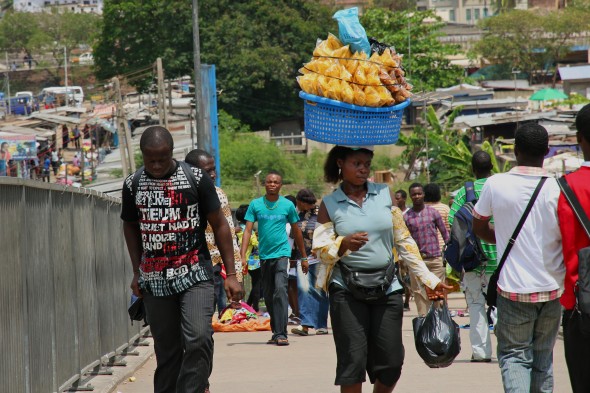
Accra. Will Ghana's oil wealth translate into improved lives for Ghanaians? Photo by Christiane Badgley
Now that Ghana has become a middle-income country, the West African nation is taking stock of the many challenges it faces, including uneven development. Authorities are consulting with experts at home and abroad on how to ensure that oil revenues benefit all Ghanaians in a sustainable manner.
Oil is not enough: Africa needs industrial development
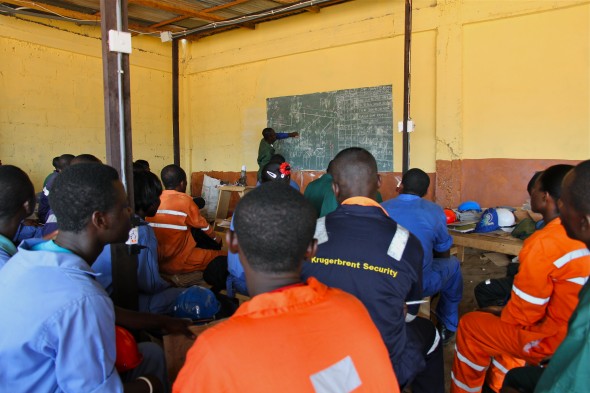
When industrial development arrives in Sekondi-Takoradi, there will be a trained workforce ready for employment. Photo by Christiane Badgley
This morning I came across an article in the Guardian, Africa must build industrial sector urgently, warns UN agency, and the timing could not be better. I’m in Guangzhou, China, marketplace for the world, and if you ever needed a reminder that manufacturing is what creates jobs and wealth and leads to real economic development, come here and look around.
Can Ghana benefit from Norway’s oil experience?
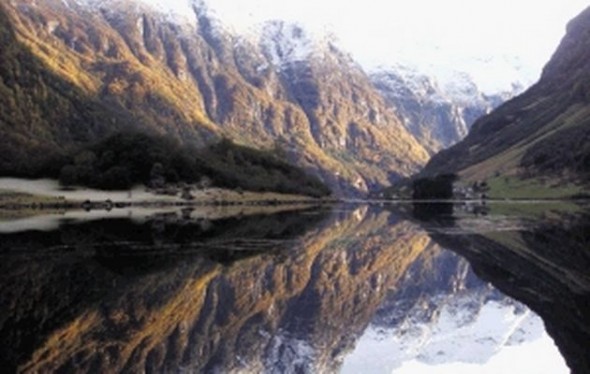
Iraqi-born geologist Farouk al-Kasim predicted Norway's big oil find and is one of the pioneers of the country's oil policy. Photo: Sunday Times, South Africa
There’s a lot of talk in Ghana about Norway, the country that has made oil work for its citizens. Ghana is looking to the Norwegian experience for insights into how best to manage its oil resources. The Norwegian Agency for Development Cooperation has an Oil for Development Program in Ghana that seeks to develop long-term institutional cooperation in the oil sector. Through this program, the Norwegian government is providing assistance in competence and capacity building within resource management, revenue management and environmental management.
Africa’s economy rebounds without jobs
What happens when an economy grows rapidly without generating jobs?
Yesterday I was talking about Ghana’s economy with a Ghanaian who is doing business in Hong Kong. On paper things are booming:
Ghana’s economic growth accelerated to an annual 23 percent in the first quarter as the West African nation began producing oil for export, the country’s statistics agency said….Expansion was led by a 162 percent jump in mining and quarrying, which includes the oil industry, while agriculture grew 39.2 percent. Ghana began production of oil from its offshore Jubilee field in December. Output is about 70,000 barrels a day and may climb to 120,000 next month, according to the field’s operator, London-based Tullow Oil Plc.
From Takoradi to Hong Kong…
I’m in Hong Kong and China for two weeks doing research. My first day here and I’ve already met someone from Takoradi and chatted about Ghana’s oil.
Small world. More to follow…
Jubilee’s oil…Bonyere’s gas: what’s going on?
Today I’m posting an article by Stephen Yeboah on the proposed Bonyere gas project. Yeboah, a Ghanaian development practitioner who focuses on the extractive industries, recently participated in a training program on oil and gas reporting funded by Revenue Watch Institute, Thomson Reuters Foundation and the International Institute of ICT Journalism (Penplusbytes).
First some background:
The Jubilee oil development project includes plans to pipe the gas released by the drilling to shore where it will be processed to generate electricity and eventually lead to further industrial development.

